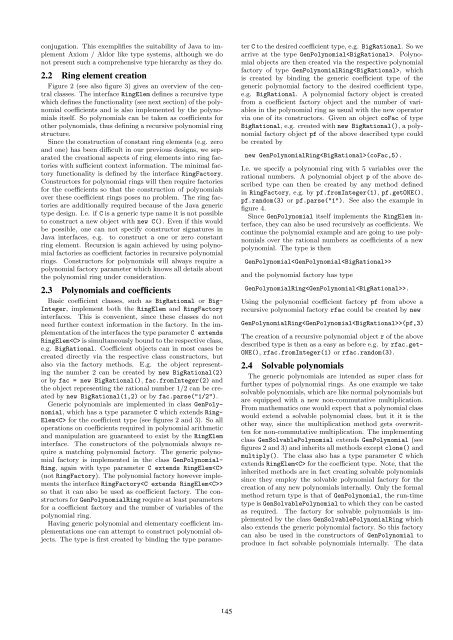4th International Conference on Principles and Practices ... - MADOC
4th International Conference on Principles and Practices ... - MADOC
4th International Conference on Principles and Practices ... - MADOC
Create successful ePaper yourself
Turn your PDF publications into a flip-book with our unique Google optimized e-Paper software.
c<strong>on</strong>jugati<strong>on</strong>. This exemplifies the suitability of Java to implement<br />
Axiom / Aldor like type systems, although we do<br />
not present such a comprehensive type hierarchy as they do.<br />
2.2 Ring element creati<strong>on</strong><br />
Figure 2 (see also figure 3) gives an overview of the central<br />
classes. The interface RingElem defines a recursive type<br />
which defines the functi<strong>on</strong>ality (see next secti<strong>on</strong>) of the polynomial<br />
coefficients <strong>and</strong> is also implemented by the polynomials<br />
itself. So polynomials can be taken as coefficients for<br />
other polynomials, thus defining a recursive polynomial ring<br />
structure.<br />
Since the c<strong>on</strong>structi<strong>on</strong> of c<strong>on</strong>stant ring elements (e.g. zero<br />
<strong>and</strong> <strong>on</strong>e) has been difficult in our previous designs, we separated<br />
the creati<strong>on</strong>al aspects of ring elements into ring factories<br />
with sufficient c<strong>on</strong>text informati<strong>on</strong>. The minimal factory<br />
functi<strong>on</strong>ality is defined by the interface RingFactory.<br />
C<strong>on</strong>structors for polynomial rings will then require factories<br />
for the coefficients so that the c<strong>on</strong>structi<strong>on</strong> of polynomials<br />
over these coefficient rings poses no problem. The ring factories<br />
are additi<strong>on</strong>ally required because of the Java generic<br />
type design. I.e. if C is a generic type name it is not possible<br />
to c<strong>on</strong>struct a new object with new C(). Even if this would<br />
be possible, <strong>on</strong>e can not specify c<strong>on</strong>structor signatures in<br />
Java interfaces, e.g. to c<strong>on</strong>struct a <strong>on</strong>e or zero c<strong>on</strong>stant<br />
ring element. Recursi<strong>on</strong> is again achieved by using polynomial<br />
factories as coefficient factories in recursive polynomial<br />
rings. C<strong>on</strong>structors for polynomials will always require a<br />
polynomial factory parameter which knows all details about<br />
the polynomial ring under c<strong>on</strong>siderati<strong>on</strong>.<br />
2.3 Polynomials <strong>and</strong> coefficients<br />
Basic coefficient classes, such as BigRati<strong>on</strong>al or Big-<br />
Integer, implement both the RingElem <strong>and</strong> RingFactory<br />
interfaces. This is c<strong>on</strong>venient, since these classes do not<br />
need further c<strong>on</strong>text informati<strong>on</strong> in the factory. In the implementati<strong>on</strong><br />
of the interfaces the type parameter C extends<br />
RingElem is simultaneously bound to the respective class,<br />
e.g. BigRati<strong>on</strong>al. Coefficient objects can in most cases be<br />
created directly via the respective class c<strong>on</strong>structors, but<br />
also via the factory methods. E.g. the object representing<br />
the number 2 can be created by new BigRati<strong>on</strong>al(2)<br />
or by fac = new BigRati<strong>on</strong>al(), fac.fromInteger(2) <strong>and</strong><br />
the object representing the rati<strong>on</strong>al number 1/2 can be created<br />
by new BigRati<strong>on</strong>al(1,2) or by fac.parse("1/2").<br />
Generic polynomials are implemented in class GenPolynomial,<br />
which has a type parameter C which extends Ring-<br />
Elem for the coefficient type (see figures 2 <strong>and</strong> 3). So all<br />
operati<strong>on</strong>s <strong>on</strong> coefficients required in polynomial arithmetic<br />
<strong>and</strong> manipulati<strong>on</strong> are guaranteed to exist by the RingElem<br />
interface. The c<strong>on</strong>structors of the polynomials always require<br />
a matching polynomial factory. The generic polynomial<br />
factory is implemented in the class GenPolynomial-<br />
Ring, again with type parameter C extends RingElem<br />
(not RingFactory). The polynomial factory however implements<br />
the interface RingFactory<br />
so that it can also be used as coefficient factory. The c<strong>on</strong>structors<br />
for GenPolynomialRing require at least parameters<br />
for a coefficient factory <strong>and</strong> the number of variables of the<br />
polynomial ring.<br />
Having generic polynomial <strong>and</strong> elementary coefficient implementati<strong>on</strong>s<br />
<strong>on</strong>e can attempt to c<strong>on</strong>struct polynomial objects.<br />
The type is first created by binding the type parameter<br />
C to the desired coefficient type, e.g. BigRati<strong>on</strong>al. So we<br />
arrive at the type GenPolynomial. Polynomial<br />
objects are then created via the respective polynomial<br />
factory of type GenPolynomialRing, which<br />
is created by binding the generic coefficient type of the<br />
generic polynomial factory to the desired coefficient type,<br />
e.g. BigRati<strong>on</strong>al. A polynomial factory object is created<br />
from a coefficient factory object <strong>and</strong> the number of variables<br />
in the polynomial ring as usual with the new operator<br />
via <strong>on</strong>e of its c<strong>on</strong>structors. Given an object coFac of type<br />
BigRati<strong>on</strong>al, e.g. created with new BigRati<strong>on</strong>al(), a polynomial<br />
factory object pf of the above described type could<br />
be created by<br />
new GenPolynomialRing(coFac,5).<br />
I.e. we specify a polynomial ring with 5 variables over the<br />
rati<strong>on</strong>al numbers. A polynomial object p of the above described<br />
type can then be created by any method defined<br />
in RingFactory, e.g. by pf.fromInteger(1), pf.getONE(),<br />
pf.r<strong>and</strong>om(3) or pf.parse("1"). See also the example in<br />
figure 4.<br />
Since GenPolynomial itself implements the RingElem interface,<br />
they can also be used recursively as coefficients. We<br />
c<strong>on</strong>tinue the polynomial example <strong>and</strong> are going to use polynomials<br />
over the rati<strong>on</strong>al numbers as coefficients of a new<br />
polynomial. The type is then<br />
GenPolynomial<br />
<strong>and</strong> the polynomial factory has type<br />
GenPolynomialRing.<br />
Using the polynomial coefficient factory pf from above a<br />
recursive polynomial factory rfac could be created by new<br />
GenPolynomialRing(pf,3)<br />
The creati<strong>on</strong> of a recursive polynomial object r of the above<br />
described type is then as a easy as before e.g. by rfac.get-<br />
ONE(), rfac.fromInteger(1) or rfac.r<strong>and</strong>om(3).<br />
2.4 Solvable polynomials<br />
The generic polynomials are intended as super class for<br />
further types of polynomial rings. As <strong>on</strong>e example we take<br />
solvable polynomials, which are like normal polynomials but<br />
are equipped with a new n<strong>on</strong>-commutative multiplicati<strong>on</strong>.<br />
From mathematics <strong>on</strong>e would expect that a polynomial class<br />
would extend a solvable polynomial class, but it it is the<br />
other way, since the multiplicati<strong>on</strong> method gets overwritten<br />
for n<strong>on</strong>-commutative multiplicati<strong>on</strong>. The implementing<br />
class GenSolvablePolynomial extends GenPolynomial (see<br />
figures 2 <strong>and</strong> 3) <strong>and</strong> inherits all methods except cl<strong>on</strong>e() <strong>and</strong><br />
multiply(). The class also has a type parameter C which<br />
extends RingElem for the coefficient type. Note, that the<br />
inherited methods are in fact creating solvable polynomials<br />
since they employ the solvable polynomial factory for the<br />
creati<strong>on</strong> of any new polynomials internally. Only the formal<br />
method return type is that of GenPolynomial, the run-time<br />
type is GenSolvablePolynomial to which they can be casted<br />
as required. The factory for solvable polynomials is implemented<br />
by the class GenSolvablePolynomialRing which<br />
also extends the generic polynomial factory. So this factory<br />
can also be used in the c<strong>on</strong>structors of GenPolynomial to<br />
produce in fact solvable polynomials internally. The data<br />
145





